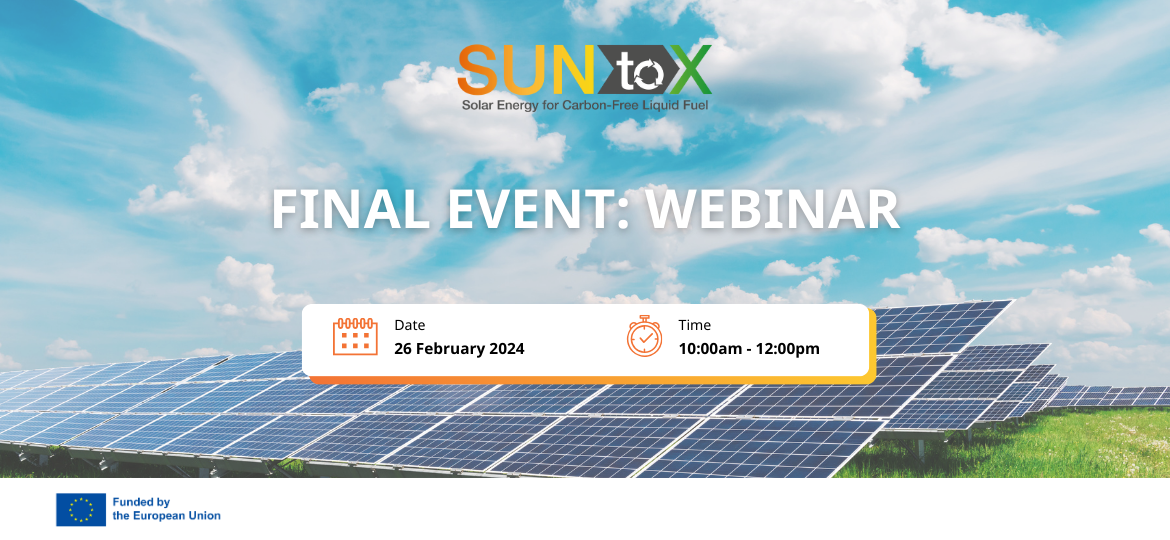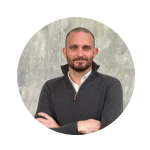
Context
The Sun-To-X project’s innovative approach involves the production of solar hydrogen and subsequent storage into a silicon hydride-based liquid fuel known as HydroSil. Beyond it’s use as a fuel we also explore it’s use for the breakdown of waste plastic to form valuable chemicals.
We are reaching the end of the Sun-To-X project and we would like to take the opportunity to disseminate our results to stakeholders in the energy industry. We will start with an introduction from the project coordinator and project officer from the European Climate, Infrastructure and Environment Executive Agency (CINEA). We will then describe our work on hydrogen production focusing on scaling up porous photoelectrochemical devices, which enable us to us to use humidity from the air as a water source, creating a free-standing solution for hydrogen production. This will be followed by an explanation on the process we have developed in the project to store this hydrogen in HydroSil and explore the use cases for this material; firstly, as a fuel and secondly to break down (depolymerise) waste plastics to create valuable products. Finally we will explain the impact of our project based on technoeconomic, lifecycle and public perception analysis and identify the next steps beyond Sun-To-X.
AGENDA
10:00 – 10:10 Project overview and context of the project in the CINEA portfolio (Hannah Johnson, Charles-André Lemarie)
10:10 – 10:30 Solar H2 production (Kevin Sivula)
10:30 – 10:50 Storage of solar H2 in HydroSil (Pierre-Emmanuel Casanova)
10:50 – 11:10 Use of HydroSil for waste plastic recycling (Thibault Cantat)
11:10 – 11:20 Project impact and outlook (Hannah Johnson)
SPEAKERS

Hannah Johnson – Senior engineer in the Materials Engineering department at Toyota Motor Europe
Hannah Johnson is a Senior Engineer in the Materials Engineering department at Toyota Motor Europe focussing on research the production of green fuels since 2017. Her research focusses on hydrogen production and CO2 conversion through (photo)electrochemical and photocatalytic methods. She is coordinator of the Sun-To-X and PH2OTOGEN projects, which focus on solar hydrogen production.

Charles-André Lemarie – Project Manager at CINEA – European Climate, Infrastructure and Environment Executive Agency
Charles-André Lemarié is a passionate scientist and highly qualified professional with a strong background in engineering and project management, driven by scientific curiosity and a desire to make a positive impact. His current role at the European Climate, Infrastructure and Environment Executive Agency (CINEA), managing and advising EU-funded renewable energy research projects for 5 years now, reflects his commitment to sustainability and to the development of innovative solutions for environmental challenges. His background spans engineering and research activities as well as research and development projects management, with interests in diverse fields such as fluid mechanics, heat transfers, concentrated solar power and energy at large. He is the Project Adviser of several artificial photosynthesis projects funded by the European Commission, including Sun-to-X

Kevin Sivula – Associate Professor of Chemical Engineering at EPFL – Ecole Polytechnique Fédérale de Lausanne – Institute of Chemical Sciences and Engineering –
Originally from the United States, Prof. Sivula studied chemical engineering at the Universities of Minnesota (Twin Cities), and California (Berkeley), before joining EPFL. He was appointed Assistant Professor in 2011 and Associate Professor in 2018. He directs the Laboratory for molecular engineering of optoelectronic nanomaterials (LIMNO), which focuses on developing materials and systems for solar energy harvesting and related applications, and teaches courses in transport phenomena and chemical product design.
Website: http://limno.epfl.ch/

Pierre-Emmanuel Casanova – Co-founder and CBO of HySiLabs.
Pierre-Emmanuel Casanova is a young and ambitious French entrepreneur. He is the co-founder and CBO of the company HySiLabs. He studied at Aix Marseille University and graduated with a master’s degree in biotechnology and sustainable development. Then he decided to complete his studies with a second master’s degree in Innovation Management in Aix en Provence and then in the United States. During his stay in the United States, he discovered entrepreneurship and never stopped being involved in it.In 2015, he co-founded HySiLabs, a start-up specialized in the transport and storage of hydrogen from a liquid carrier (a worldwide innovation that is patented over 70 times). This innovation will play a key role in the energy and social transition and is currently at the pre-industrialization stage.Since its creation, HySiLabs today HSL Technologies has won several awards and distinctions, the company has also raised several million euros from investors to finance its development and today has over 30 employees. Pierre-Emmanuel Casanova is passionate about entrepreneurship and innovation. He is an active and involved personality in the PACA Region and among his peers, he is notably a member of the French Tech board. He advocates strong values that he perpetuates within HSL Technologies by supporting associations like ByBye Sexism. With his teams, he does everything possible to make a difference and contribute to solving the major challenges of our time, such as climate change, energy and social transition.

Thibault Cantat – CEA Research Director
Thibault Cantat is a group leader at the Alternative Energies and Atomic Energy Commission (CEA) in France. He obtained his Ph.D. in Chemistry in 2007 at the Ecole Polytechnique, France. After a postdoctoral stay at Los Alamos National Laboratory, he started a research group focused on the activation and recycling of CO2, depolymerization of wood lignin and mechanistic investigations using experimental and computational chemistry, at CEA Saclay. For his contribution on CO2 chemistry, he was awarded the Grand Prix Scientifique of the Louis D. Foundation by the Institut de France (2013). He obtained a Starting Grant in 2013 and a Consolidator Grant in 2018 from the ERC. In parallel, he provides scientific advice to policy makers and was nominated panel member at the CCUS workshop for Mission Innovation. In 2017, he was an expert and co-author of a report on Carbon Capture and Utilization for the Scientific Advice Mechanism, SAPEA, commissioned by the European Commission. Since 2020, he is the Program Leader on the Carbon Circular Economy at CEA (incl. biofuels, Power-to-X and biomass conversion technologies).
